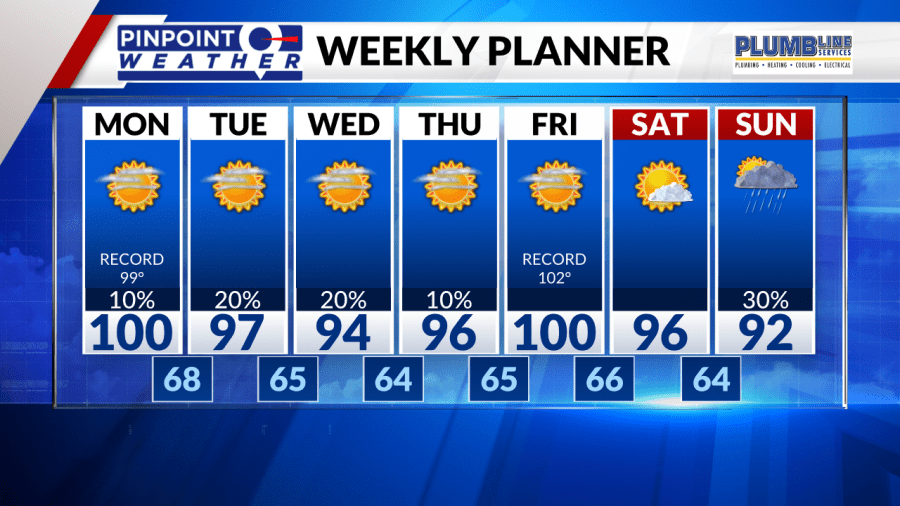DENVER (KDVR) — Record-breaking heat has arrived in Colorado. Triple-digit temperatures are in the forecast this week.
The Pinpoint Weather Team is forecasting 100 degrees in Denver on Monday. The record is 99 degrees set in 2020.

The National Weather Service said that since 1872, there have only been 103 days where Denver recorded 100 degrees.
The most 100-degree days in a year happened in 2012. There were 13 100-degree days that year.
So far in 2022, Denver has recorded three days at 100 degrees or above: June 11, July 9, and July 10.
The hot weather might have you running to your thermostat and dropping the temperature in your house. There are some ways you can ease the pain on your wallet when the electricity bill comes in.
Here are some tips from the United States Department of Energy:
Thermostat
- Set your thermostat at a temperature you find comfortable
- Keep your house warmer than normal when you are away, and lower the thermostat setting when you return home and need cooling. A programmable thermostat allows you to do this automatically and without sacrificing comfort.
- Avoid setting your thermostat at a colder setting than normal when you first turn on your air conditioner. It will not cool your home any faster and could result in excessive cooling and unnecessary expense.
Windows
- Install window coverings to prevent heat gain through your windows during the day.
- Find out about window treatments and coverings that can improve energy efficiency
Use fans
- Turn off ceiling fans when you leave the room. Remember that fans cool people, not rooms, by creating a wind chill effect.
- When you shower or take a bath, use the bathroom fan to remove heat and humidity from your home. Your laundry room might also benefit from spot ventilation. Make sure bathroom and kitchen fans are vented to the outside (not just to the attic).
Keep your cooling system running efficiently
- Have your cooling equipment maintained on a regular basis
- Avoid placing lamps or TV sets near your room air-conditioning thermostat. The thermostat senses heat from these appliances, which can cause the air conditioner to run longer than necessary
- Vacuum your air intake vents regularly to remove any dust buildup. Ensure that furniture and other objects are not blocking the airflow through your registers.
Think about your appliances and lighting
- Turn off your lights and lamps when you are not using them
- Wash full loads of dishes and clothes for better efficiency
Keep hot air from leaking into your home
- Seal cracks and openings to prevent warm air from leaking into your home.
- Add caulk or weather-stripping to seal air leaks around doors and windows.
Lower your water heating costs
The USDE said water heating accounts for about 18% of the energy consumed in your home. The Consumer Product Safety Commission recommends setting your water heater at no more than 120 degrees Fahrenheit to prevent scalding. The lower setting will also conserve energy and save money.
Be sure to download the free Pinpoint Weather App to stay up-to-date with the newest weather data as it comes in.
